Ultrasound needle guides for GE transducers
Victor Duran2024-12-04T16:29:31-05:00Reusable & Disposable Ultrasound Needle Guides for GE (General Electric)
We offer needle guides for most GE (General Electric) ultrasound transducers. Check the label on the connector to identify your transducer’s model and find it in the list below (in alphabetical order).
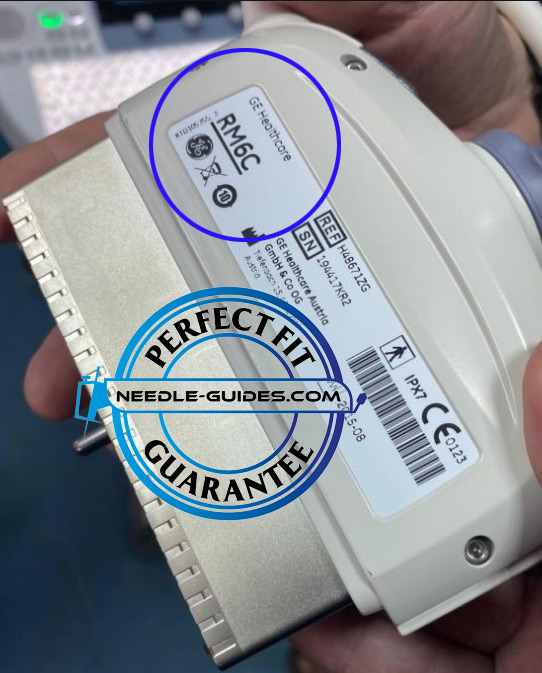
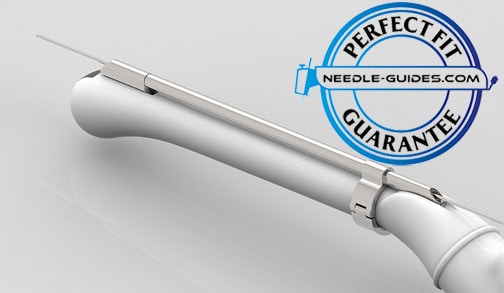
Reusable GE ultrasound needle guides
Transvaginal GE reusable needle guides
| GE E72 Transducer Needle Guide – Reusable | Transvaginal |
| GE E721 Transducer Needle Guide – Reusable | Transvaginal |
| GE E7C-RC Transducer Needle Guide – Reusable | Transvaginal |
| GE E8C Transducer Needle Guide – Reusable | Transvaginal |
| GE E8C-RS Transducer Needle Guide – Reusable | Transvaginal |
| GE E8CS Transducer Needle Guide – Reusable | Transvaginal |
| GE IC5-9 Transducer Needle Guide – Reusable | Transvaginal |
| GE IC5-9-D Transducer Needle Guide – Reusable | Transvaginal |
| GE IC5-9H Transducer Needle Guide – Reusable | Transvaginal |
| GE IC9-RS Transducer Needle Guide – Reusable | Transvaginal |
| GE MTZ Transducer Needle Guide – Reusable | Transvaginal |
| GE MZ Transducer Needle Guide – Reusable | Transvaginal |
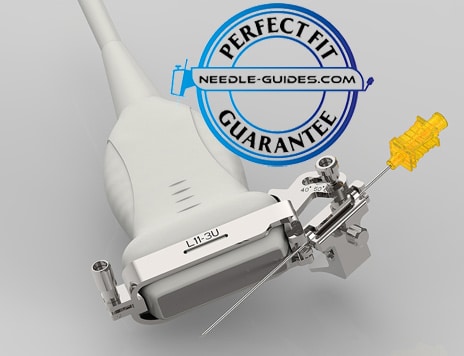
Linear GE reusable needle guides
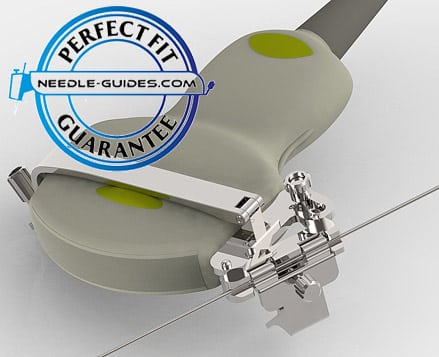
Convex GE reusable needle guides
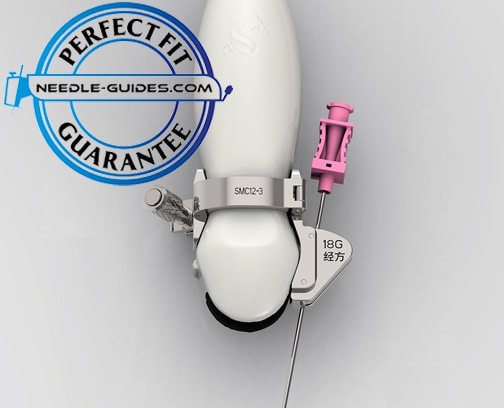
Micro convex GE reusable needle guides
| GE 3CRF Transducer Needle Guide – Reusable | Microconvex |
| GE 8C Transducer Needle Guide – Reusable | Microconvex |
| GE 8C-RS Transducer Needle Guide – Reusable | Microconvex |
| GE AB2-5 Transducer Needle Guide – Reusable | Microconvex |
| GE AB2-7 Transducer Needle Guide – Reusable | Microconvex |
| GE AB2-7-D Transducer Needle Guide – Reusable | Microconvex |
| GE AB2-7-RS Transducer Needle Guide – Reusable | Microconvex |
| GE C2-7-D Transducer Needle Guide – Reusable | Microconvex |
| GE C2-7VN-D Transducer Needle Guide – Reusable | Microconvex |
| GE C3-10-D Transducer Needle Guide – Reusable | Microconvex |
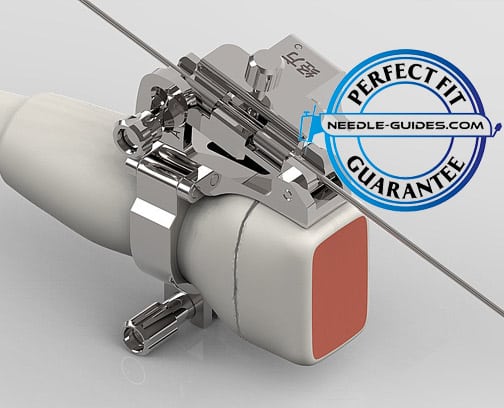
Phased Array GE reusable needle guides
| GE 3S Transducer Needle Guide – Reusable | Phased Array |
| GE 3Sc Transducer Needle Guide – Reusable | Phased Array |
| GE 3Sc-RS Transducer Needle Guide – Reusable | Phased Array |
| GE 3S-D Transducer Needle Guide – Reusable | Phased Array |
| GE 3SP-D Transducer Needle Guide – Reusable | Phased Array |
| GE 3S-RS Transducer Needle Guide – Reusable | Phased Array |
| GE 4Vc Transducer Needle Guide – Reusable | Phased Array |
| GE 4Vc-D Transducer Needle Guide – Reusable | Phased Array |
| GE 5S Transducer Needle Guide – Reusable | Phased Array |
| GE 5S-RS Transducer Needle Guide – Reusable | Phased Array |
| GE M3S Transducer Needle Guide – Reusable | Phased Array |
| GE M4S Transducer Needle Guide – Reusable | Phased Array |
| GE M5S Transducer Needle Guide – Reusable | Phased Array |
| GE M5Sc Transducer Needle Guide – Reusable | Phased Array |
| GE M5Sc-D Transducer Needle Guide – Reusable | Phased Array |
| GE M5S-D Transducer Needle Guide – Reusable | Phased Array |
| GE S1-5 Transducer Needle Guide – Reusable | Phased Array |
| GE S1-5-D Transducer Needle Guide – Reusable | Phased Array |
Volumetric probe GE reusable needle guides
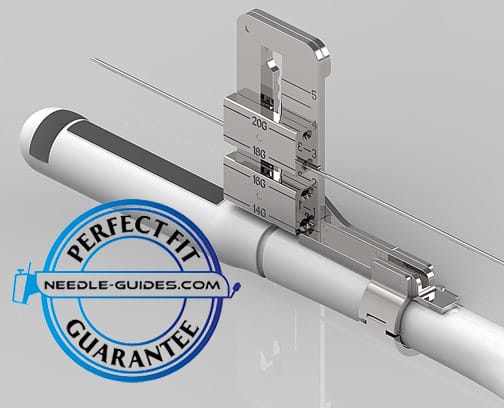
Biplane Transrectal GE reusable needle guides
| GE BE9C Transducer Needle Guide – Reusable | Biplane Transrectal |
| GE BE9CS Transducer Needle Guide – Reusable | Biplane Transrectal |
| GE BE9CS-D Transducer Needle Guide – Reusable | Biplane Transrectal |
| GE BE9CS-RS Transducer Needle Guide – Reusable | Biplane Transrectal |
| GE ERB Transducer Needle Guide – Reusable | Biplane Transrectal |
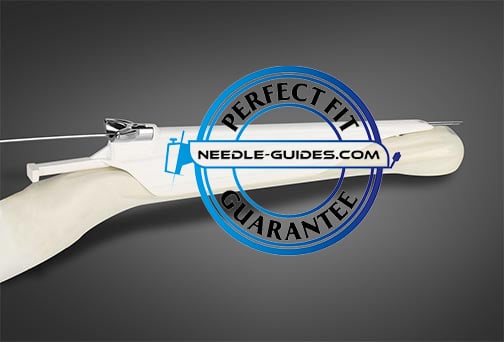
GE Disposable endocavity ultrasound needle guides

Can't find your GE (General Electric) ultrasound needle guide? We can help!
Ultrasound Needle Guide Quotation request
"*" indicates required fields



TRANSVAGINAL & ENDOCAVITY ULTRASOUND NEEDLE GUIDES FOR GE PROBES
A needle guide mounted on on your GE (General Electric) transvaginal transducer is primarily used for ultrasound-guided procedures that involve accessing the pelvic or reproductive organs through the vaginal canal. Specifically, the transvaginal transducer is specifically designed for imaging within the female pelvis and provides high-resolution images in close proximity to the organs of interest. Correspondingly, the needle guide, in conjunction with the transvaginal transducer, facilitates accurate needle placement and enhances procedural guidance for various medical purposes, including:
Oocyte retrieval: A needle guide mounted on your GE (General Electric) transvaginal transducer can be employed for transvaginal oocyte retrieval in assisted reproductive techniques such as in vitro fertilization (IVF). For this purpose, it assists in precisely guiding the needle to the ovarian follicles, allowing for the extraction of mature eggs for fertilization in the laboratory.
Embryo transfer: A needle guide used with on your GE (General Electric) transvaginal transducer can aid in accurately placing the catheter for embryo transfer into the uterine cavity during IVF, after fertilization of the eggs. This improves the chances of successful embryo implantation and subsequent pregnancy.
Transvaginal drainage and aspirations: The needle guide fitted on on your GE (General Electric) transvaginal transducer can be used for draining fluid collections, such as ovarian cysts or pelvic abscesses. For this reason, it helps in guiding the needle precisely to the target area, allowing for effective drainage or aspiration of fluids.
Biopsy or sampling: In certain cases, a transvaginal needle biopsy may be necessary to obtain tissue samples from the pelvic organs, such as the ovaries or uterus. With this in mind, the needle guide on a transvaginal transducer assists in accurately targeting the desired tissue for biopsy, aiding in the diagnosis of conditions such as ovarian or endometrial cancers.
In summary, the combination of a needle guide with on your GE (General Electric) transvaginal transducer enables real-time visualization and precise guidance for gynecological procedures. It improves the accuracy and safety of needle placements, reducing the risk of complications and improving patient outcomes.

ULTRASOUND NEEDLE GUIDES FOR LINEAR GE PROBES
A needle guide mounted on on your GE (General Electric) linear transducer is commonly used for ultrasound-guided procedures that require a linear imaging format. Specifically, the linear transducer has a rectangular or linear shape, providing a high-resolution image in a narrow field of view. Correspondingly, the needle guide, in combination with the linear transducer, facilitates accurate needle placement and enhances procedural guidance for various medical purposes, including:
Musculoskeletal interventions: A needle guide used in conjunction with on your GE (General Electric) linear transducer is often used for ultrasound-guided injections and aspirations in musculoskeletal procedures. For this purpose, it assists in precisely targeting joints, bursae, tendons, and muscles, allowing for accurate delivery of medications, such as corticosteroids or local anesthetics, or for aspiration of fluid or cysts.
Interventional radiology: A needle guide equipped with on your GE (General Electric) linear transducer can be utilized for biopsies, abscess drainages, or tumor ablations in interventional radiology procedures. With this in mind, it helps guide the needle to the desired target within the liver, kidneys, breast, thyroid, or other superficial or deep-seated structures, ensuring accurate placement and minimizing the risk of complications.
Vascular procedures: A needle guide used with on your GE (General Electric) linear transducer assists in identifying and accessing the blood vessel with precision during vascular access procedures, such as ultrasound-guided arterial or venous catheterizations. Therefore, this allows for safer and more effective catheter insertions, reducing the risk of complications like arterial puncture or hematoma formation.
Regional anesthesia and pain management: A needle guide used with on your GE (General Electric) linear transducer can aid in accurately targeting specific nerves or nerve clusters for nerve blocks or pain management procedures. For this reason, this enables the anesthesiologist to deliver local anesthetic agents precisely, resulting in effective pain relief or anesthesia for surgeries.
In summary, the use of a needle guide fitted with on your GE (General Electric) linear transducer enhances visualization and improves the accuracy of needle placement, increasing procedural success rates and patient safety.

ULTRASOUND NEEDLE GUIDES FOR CONVEX GE PROBES
A needle guide mounted on on your GE (General Electric) convex transducer is typically used for ultrasound-guided procedures that involve the insertion of a needle or catheter into the body. Specifically, the convex transducer refers to the type of ultrasound probe that has a curved or convex shape, allowing for a wider field of view and deeper penetration into the body.
Therefore, the needle guide serves as a tool to assist in accurate and precise needle placement during procedures such as:
Biopsy: A needle guide can be used during ultrasound-guided biopsies, where a tissue sample is obtained for diagnostic purposes. For this purpose, the guide helps in aligning the needle with the target tissue, ensuring that the biopsy is performed at the desired location.
Aspiration and drainage: A needle guide can be used to guide the needle precisely to the desired location in procedures that involve draining fluid collections or aspirating fluid from a specific area, while minimizing the risk of damaging surrounding structures.
Nerve blocks and regional anesthesia: A needle guide equipped with your GE (General Electric) convex transducer can assist in accurate needle placement near nerves or specific anatomical landmarks during nerve blocks or regional anesthesia procedures. In particular, this helps in delivering local anesthetic agents precisely, ensuring effective pain management or surgical anesthesia.
Vascular access: A needle guide can aid in identifying and targeting the desired blood vessel accurately when inserting a central venous catheter or performing peripheral vascular access. In this case, facilitating in successful cannulation and reducing the risk of complications.
In summary, a needle guide fitted on on your GE (General Electric) convex transducer provides real-time visualization and guidance, allowing medical professionals to perform procedures with increased precision, reduced risk, and improved patient outcomes.

ULTRASOUND NEEDLE GUIDES FOR MICRO CONVEX GE PROBES
A needle guide mounted on on your GE (General Electric) micro convex transducer is typically used for ultrasound-guided procedures that require imaging in small or confined spaces. Specifically, the micro convex transducer has a small convex shape, allowing for improved imaging in areas where access is limited. Correspondingly, the needle guide, in combination with the micro convex transducer, facilitates accurate needle placement and enhances procedural guidance for various medical purposes, including:
Transesophageal echocardiography (TEE): In TEE procedures, a needle guide equipped with your GE (General Electric) micro convex transducer can be used for guidance during transseptal punctures. For this purpose, it helps in accurately directing the needle through the interatrial septum of the heart, enabling access to the left atrium for interventions such as atrial septal defect closure or ablation procedures.
Pediatric procedures: A needle guide mounted on on your GE (General Electric) micro convex transducer can aid in accurate needle placement when performing ultrasound-guided procedures on pediatric patients. In particular, it can be used for procedures such as vascular access, joint injections, or biopsies in small anatomical structures.
Neonatal and infant cranial procedures: A needle guide seated on your GE (General Electric) micro convex transducer can assist in procedures such as lumbar punctures or intraventricular catheter placements in neonatal and infant care. With this in mind, it helps in guiding the needle accurately for cerebrospinal fluid collection or neurosurgical interventions while minimizing the risk of complications.
Small parts interventions: The needle guide attached on your GE (General Electric) micro convex transducer can also be used for procedures involving small organs or structures such as the thyroid, salivary glands, or superficial masses. In this situation it assists in accurate needle placement for biopsies, aspirations, or therapeutic injections.
In summary, the use of a needle guide fitted on your GE (General Electric) micro convex transducer allows for improved visualization and precise guidance in small or challenging anatomical spaces. It enhances procedural accuracy, reduces the risk of complications, and improves patient outcomes.

ULTRASOUND NEEDLE GUIDES FOR GE PHASED ARRAY PROBES
A needle guide mounted on on your GE (General Electric) phased array transducer can be used for ultrasound-guided procedures that require imaging with a phased array technology. Specifically, the phased array transducer uses multiple small elements to generate and steer ultrasound beams electronically, allowing for real-time imaging of a wide field of view. Correspondingly, the needle guide, in combination with the phased array transducer, facilitates accurate needle placement and enhances procedural guidance for various medical purposes, including:
Cardiac procedures: A needle guide attached on your GE (General Electric) phased array transducer can aid in procedures such as pericardiocentesis or myocardial biopsies in cardiac interventions. For this purpose, it helps guide the needle accurately to the target area within the heart, allowing for precise sampling or fluid drainage.
Transcranial Doppler (TCD): During TCD examinations, a needle guide on your GE (General Electric) phased array transducer can be utilized for procedures such as transcranial Doppler monitoring or embolism detection. In this situation, it assists in accurately positioning the transducer to obtain optimal ultrasound signals through the skull, enhancing the accuracy and reliability of the diagnostic measurements.
Transesophageal echocardiography (TEE): For TEE procedures, a needle guide on a phased array transducer can aid in transseptal punctures or interventions within the heart. In particular, it provides guidance for accurate needle placement through the interatrial septum or imaging guidance during intracardiac procedures.
Abdominal and pelvic interventions: A needle guide used with on your GE (General Electric) phased array transducer can assist in interventions such as biopsies, fluid aspirations, or drainages in certain abdominal or pelvic procedures. With this in mind, it enables accurate needle placement while providing a wide field of view for visualizing the target organ or structure.
In summary, the use of a needle guide fitted on your GE (General Electric) phased array transducer allows for real-time imaging and precise needle guidance in various medical procedures. It enhances procedural accuracy, improves visualization, and contributes to better patient outcomes.

ULTRASOUND NEEDLE GUIDES FOR BI-PLANE TRANSRECTAL GE PROBES
A needle guide mounted on on your GE (General Electric) biplane transducer is used for specialized ultrasound-guided procedures that require imaging from two perpendicular planes simultaneously. Specifically, the biplane transducer consists of two transducer elements oriented at right angles to each other, providing real-time imaging in orthogonal planes. Correspondingly, a needle guide mounted on a biplane transducer, facilitates accurate needle placement and enhances procedural guidance for specific medical purposes, including:
Transrectal prostate interventions: A needle guide used in conjunction with on your GE (General Electric) biplane transducer can assist in accurate needle placement within the prostate gland in transrectal procedures such as prostate biopsies or brachytherapy. In similar fashion, the dual-plane imaging capability allows for precise targeting and sampling from different angles, improving the diagnostic yield and reducing the risk of complications.
Cardiac interventions: A needle guide equipped with your GE (General Electric) biplane transducer can aid in accurate needle placement or device positioning during certain cardiac procedures, such as transcatheter structural heart interventions. As a result, the biplane imaging helps visualize the cardiac structures from multiple angles, facilitating precise guidance and ensuring optimal procedural outcomes.
Neurosurgical procedures: A needle guide used with on your GE (General Electric) biplane transducer can be used for interventions such as stereotactic biopsies or intracranial interventions in neurosurgery. At the same time, the biplane imaging allows for accurate targeting of brain lesions or structures from different angles, improving the precision and safety of the procedures.
Orthopedic interventions: A needle guide on on your GE (General Electric) biplane transducer can aid in accurate needle placement for certain orthopedic procedures, such as joint injections or aspirations. For this purpose, the dual-plane imaging enables better visualization of the joint space or surrounding structures, enhancing procedural accuracy and reducing the risk of complications.
In summary, a needle guide fitted on your GE (General Electric) biplane transducer provides simultaneous imaging from orthogonal planes, allowing for enhanced visualization and precise needle guidance in specific medical procedures. It improves procedural accuracy, reduces complications, and contributes to better patient outcomes in these specialized interventions.
